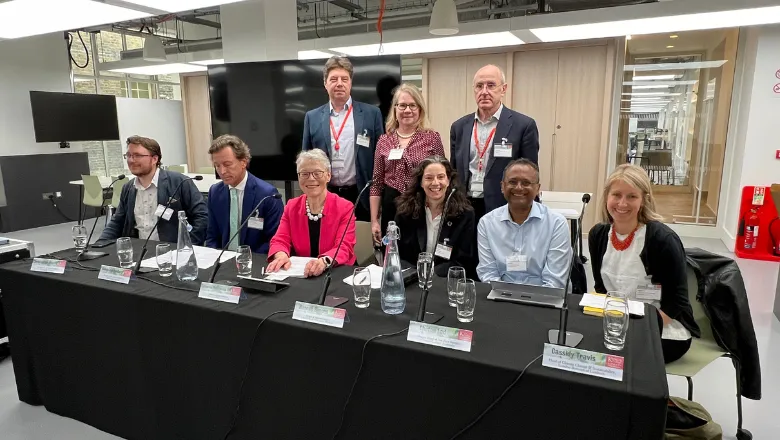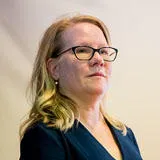Carbon markets play a crucial role in achieving net zero by offering a robust financial mechanism that rewards carbon-reducing projects such as afforestation, renewable energy adoption, and energy efficient improvements."
Professor Raúl Rosales
19 June 2024
“We must make sure perfection isn't the enemy of the good,” says sustainability expert at Net Zero panel
King’s Net Zero Centre hosted panel of government and industry sustainability experts this month.

One year on since setting up the King’s Net Zero Centre, a panel of leading experts from industry, finance and government discussed solutions for green innovation at a panel event in June.
Opened by Centre Directors Professor Barbara Shollock and Professor Anatoly Zayats welcomed an audience of King’s academics and industry representatives to the ‘One Year of Green Innovation’ event.
The panel, chaired by Catherine McGuinness CBE (Connected Place Catapult), discussed how innovation can help decarbonise our society and what solutions there are for sustainability. The panellists discussed solutions such as councils developing retrofit programmes to make homes better at retaining heat and reducing carbon emissions.
They spoke about the need for cross-sector collaboration to tackle the net zero targets and the role the King’s Net Zero Centre can play in ‘matchmaking’ industry and government groups.
McGuinness was joined by Christopher Morris (Sustainable Ventures), George von Waldburg (ICE Futures Europe), Cassidy Travis (London Borough of Lambeth), Chetan Lad (Greater London Authority), and Hannah Simons (Lloyds Bank Corporate Markets).
McGuiness said, “Working with academia is no longer a nice-to-have. We need the thinkers to be helping us take a ‘systems approach’.”
Christopher Morris, co-founder and partner of Sustainable Ventures, which offers a programme to support sustainability start-ups in Lambeth said, “Institutions like this can act as a hub to bring together stakeholders to collaborate on solutions, as well as being a conduit for innovators.”
Part of the Faculty of Natural, Mathematical and Engineering Sciences, the Net Zero Centre works with disciplines as diverse as law, engineering, physical, mathematical and social sciences to nurture and facilitate discoveries to push society towards net zero.
Explaining the purpose of the Centre, Professor Raúl Rosales, Deputy Director, said, “our ambition is to serve as a hub for innovative science and engineering, delivering solutions in the economy through accelerators and a supportive financial ecosystem.
“The disruption that science and technology present in achieving net zero targets in energy systems requires a clear understanding of the underlying technologies and their infrastructure requirements to scale up, significant risk mitigation and urgent investment.”
The panellists discussed the UK’s Carbon Border Adjustment Mechanism (CBAM), which will be implemented by the government by 2027. It will apply a carbon price to imported carbon-intensive goods to ensure a carbon price is paid and is comparable to similar domestic products.
Professor Raúl Rosales said: “The ambition of the Centre is to deliver solutions in the economy through accelerators and a supportive financial ecosystem. Achieving this requires the right policy framework across industries to deploy technology, mobilise funds and leverage the carbon markets to address the 5-10 percent of emissions considered unavoidable.
“Carbon markets play a crucial role in achieving net zero by offering a robust financial mechanism that rewards carbon-reducing projects such as afforestation, renewable energy adoption, and energy efficient improvements.”
George von Waldburg, Director Environmental Markets at ICE Futures Europe said, “We must make sure perfection isn’t the enemy of good. People get worried about reputation and so they don’t do anything for climate mitigation. The volume of carbon traded is less than three per cent through voluntary markets. Without the mandatory markets it’s nothing. Imagine what we could do if we can galvanise the voluntary markets.”
The event closed with a networking reception and a showcase of posters created by PhD students associated with the Net Zero Centre. Guests voted on the effectiveness of the posters and the Engineering PhD candidates Fiona Simpson and Ningyou Hou were named as winners.



